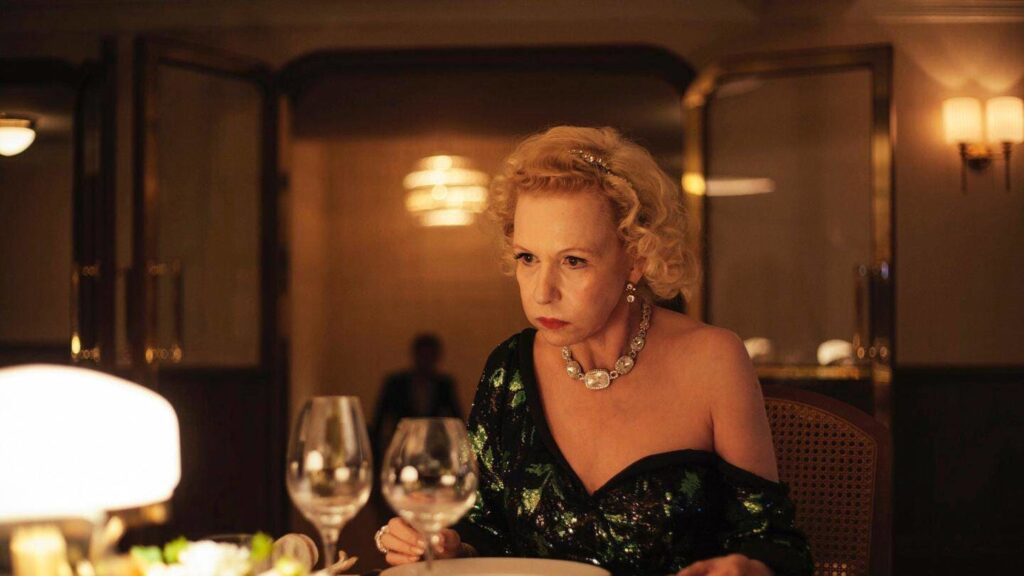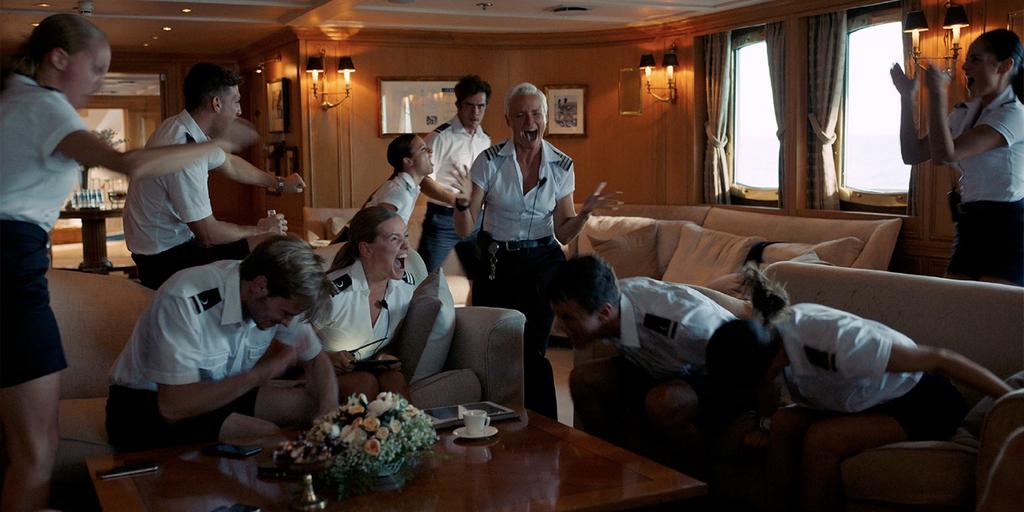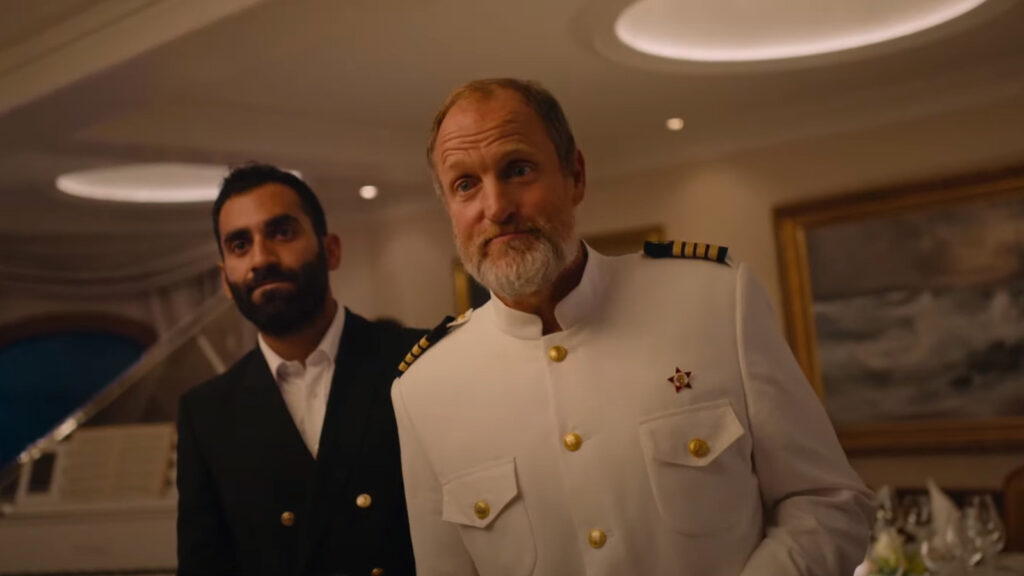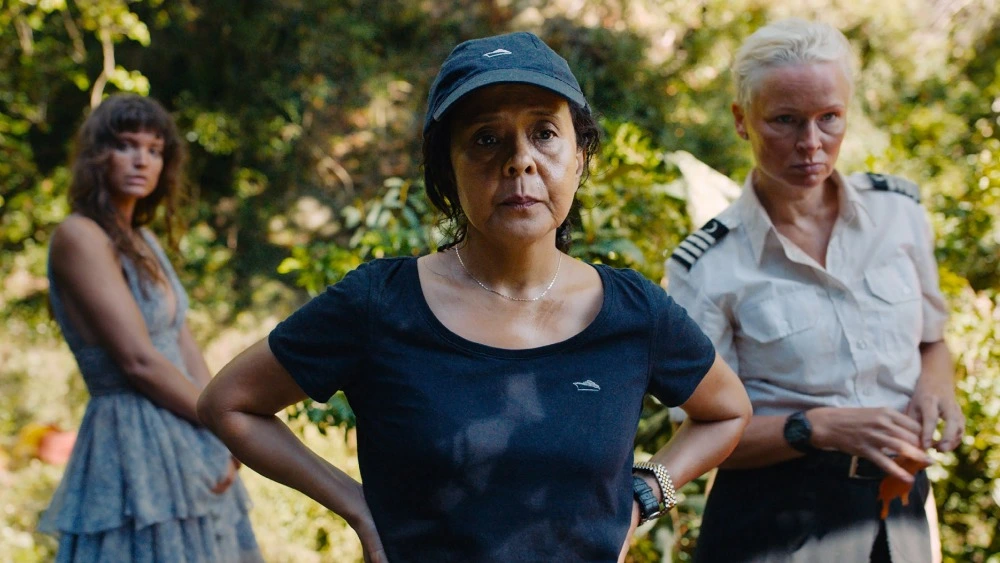
The opening scenes of Triangle of Sadness, the latest sharply etched provocation from writer-director Ruben Östlund, suggests that the Swedish filmmaker has once again shifted his satirical sights. After splintering the nuclear family in Force Majeure and skewering the pomposity of the art world (sometimes brilliantly, sometimes tediously) with The Square, Östlund opens his newest effort at yet another swanky location: a modeling agency. Strolling amid the male performers—there are enough six-packs on display to fill the soda aisle at Wal-Mart—a preening media personality (Thobias Thorwid) remarks on the industry’s inverse relationship between prestige and temperament; the fancier the brand, the grumpier the models tend to appear. This pithy observation is followed by a faintly humiliating audition scene in which the gorgeous Carl (Harris Dickinson) is instructed on how to walk the runway with a semblance of rhythm, then a catwalk sequence where eager onlookers are unceremoniously shunted aside to make room for more exalted clientele.
This playful, reproachful introduction insinuates that Triangle of Sadness will proceed as a systematic dismantling of the bizarre rituals and entrenched smugness of the land of high fashion. But Östlund’s aim isn’t so small. No, it turns out instead that his target is no less than all of western civilization. This movie, with its beaming smiles and gleaming surfaces and gauche desires and festering underbellies, seeks to rip up the social contract and expose humanity’s rotted core. Superficially speaking, it’s attacking the shamelessness of the ultra-wealthy, but that’s only half the game. Sure, Östlund wants to eat the rich, but if he inadvertently devours some poor people in the process, more’s the better.

The notion that the One Percent play by a separate set of rules—that they consider themselves unbound by the codes of behavior which apply to most people, to the point that they’re practically a different species of human—isn’t especially novel. And as a work of satire, Triangle of Sadness doesn’t offer much new insight into the obscenity of the privileged. But it is executed with such lacerating wit, and with such total commitment to its vulgar vision, that it nevertheless lends old themes new force. Artists who dress up banal material with showy misdirection are often accused of smearing lipstick on pigs. Östlund serves the pig for dinner, then smirks as his characters vomit its innards all over the fine china.
That scene, in all its majestic revulsion, arrives later. The first part of Triangle of Sadness—the title refers literally to the patch of skin between the nose and the eyebrows, and figuratively to the film’s three-legged structure—follows Carl and Yaya (Charlbi Dean), two careless beauties who are locked in a relationship that seems less amorous than convenient. We meet them at an upscale restaurant, where the simple matter of paying the bill becomes a fraught interrogation of male insecurity, female entitlement, and coded body language. For these torchbearers of haute couture, a pleasant endearment (“Thank you, honey”) is but the opening salvo in a passive-aggressive war of wills.

Despite their air of politeness, these are not nice people, which is why Östlund so enjoys mocking them, reveling as he peels back their mask of civility and refinement to reveal their underlying pettiness and narcissism. But they aren’t evil, either; one of the interesting things about Triangle of Sadness is that Carl and Yaya don’t clearly occupy the roles of either villains or heroes. Ignore their exquisite clothes and outrageous good looks, and their strained romance—a cocktail of bitterness, jealousy, and genuine attraction—isn’t all that different from the protagonists of a typical relationship drama. In fact, once they embark on the luxury cruise that sends the movie into its boisterous second act (naturally, their passage is free, part and parcel of their work as influencers), you could argue that they’re two of the most well-adjusted people on board.
The competition for least well-adjusted—for the worst person in the boat, to paraphrase a different Scandinavian picture that recently competed at the Cannes Film Festival (where Triangle of Sadness won the Palme d’Or, Östlund’s second consecutive triumph following The Square)—is fierce. Östlund arrays his sleek ocean liner with a panoply of loathsome well-heeled buffoons, each of whom acquires just enough dimension to evade generic caricaturing. There’s the lonely tech guru (Henrik Dorsin), who’s only too happy to pull out his wallet if it will convince women to talk to him; the fertilizer magnate (Zlatko Buric), who’s fond of quoting the capitalistic witticisms of Ronald Reagan, and who introduces himself with the immortal line, “I sell shit”; and the cute old married couple (Amanda Walker and Oliver Ford Davies), who made their fortune manufacturing hand grenades. Theoretically presiding over this monstrous assortment of European affluence is the ship’s American captain (a nicely cast Woody Harrelson), who spends most of the journey holed up in his cabin, guzzling booze. When Paula (Vicki Berlin), the exceedingly patient head of guest services, informs the vessel’s commander that he’s obligated to hold a dinner for his fancy fares—and that he’s welcome to do so any day but Thursday—he immediately responds, “Thursday’s fine.”

Östlund chronicles the misadventures of these financially wealthy, morally bankrupt scoundrels with impassive rigor. Again, there isn’t anything incredibly perceptive about his cultural commentary—to paraphrase Fitzgerald, the rich are different from you and me, except when it comes to indigestion—but his presentation of simpering elites and grimacing underlings is so finely calibrated that it nonetheless acquires meaning. (In this regard, Triangle of Sadness might pair well with Speak No Evil, another exaggerated study of social mores and civilized strictures; both include crucial scenes of dates reluctantly picking up the check.) An offhand remark about a shirtless staffer carries painful consequences, a persistent request to scrub non-existent sails must be accommodated, and that glamorous three-course meal soon transforms a dining hall into a toilet. It’s foul, but it’s fun.

For most of its runtime, Triangle of Sadness is entertaining but repetitive. In its final act, however, it grows nervier. At one point during the voyage, a guest cheerily suggests to a crewmember that they temporarily switch roles; the wealthy woman will become the assistant, waiting on the uniformed attendant as she relaxes in the lavish pool. It’s forced pantomime—naturally, the poor subordinate is frozen with fear about how to respond—but following a surprise event, this swapped dynamic takes shape for real. A previously unseen cleaner (Dolly De Leon) ascends from servant to master, our favorite Reagan enthusiast begins earnestly quoting Karl Marx, and the ship is metaphorically turned upside-down.
What ensues manages to be exciting and unpredictable—energized by the liberating sensation that anything can happen—even as it reinforces the movie’s previously established themes of privilege and resentment. Beauty and wealth, Östlund suggests, can take various forms, but the only true currency is power. We all may perform the same basic bodily functions. But in the end, the shit still flows from bow to stern.
Grade: B+
Jeremy Beck is the editor-in-chief of MovieManifesto. He watches more movies and television than he probably should.
